Petrie: Egyptian Tales
XIIth Dynasty: The Adventures of Sanehat
The hereditary prince, royal seal-bearer, confidential friend, judge, keeper of the gate of the foreigners, true and beloved royal acquaintance, the royal follower Sanehat says:—
I attended my lord as a follower of the king, of the house of the
hereditary princess, the greatly favoured, the royal wife,
Ankhet-Usertesen, who shares the dwelling of the royal son Amenemhat in
Kanefer.
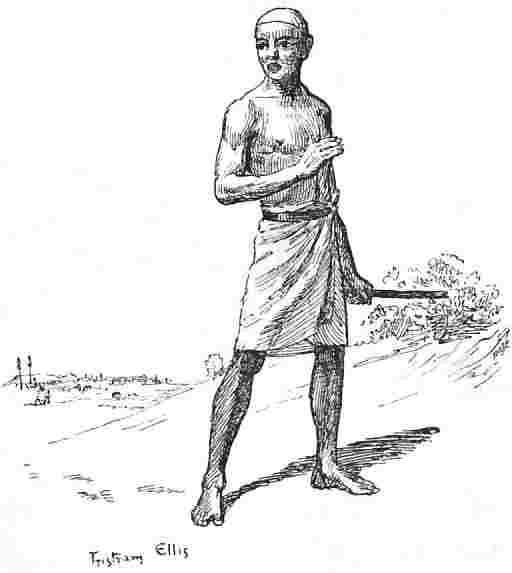
In the thirtieth year, the month Paophi, the seventh day the god entered his horizon, the king Sehotepabra flew up to heaven and joined the sun's disc, the follower of the god met his maker. The palace was silenced, and in mourning, the great gates were closed, the courtiers crouching on the ground, the people in hushed mourning.
His majesty had sent a great army with the nobles to the land of the Temehu (Lybia), his son and heir, the good god king Usertesen as their leader. Now he was returning, and had brought away living captives and all kinds of cattle without end. The councillors of the palace had sent to the West to let the king know the matter that had come to pass in the inner hall. The messenger was to meet him on the road, and reach him at the time of evening: the matter was urgent. "A hawk had soared with his followers." Thus said he, not to let the army know of it Even if the royal sons who commanded in that army send a message, he was not to speak to a single one of them. But I was standing near, and heard his voice while he was speaking. I fled far away, my heart beating, my arms failing, trembling had fallen on all my limbs. I turned about in running to seek a place to hide me, and I threw myself between two bushes, to wait while they should pass by.
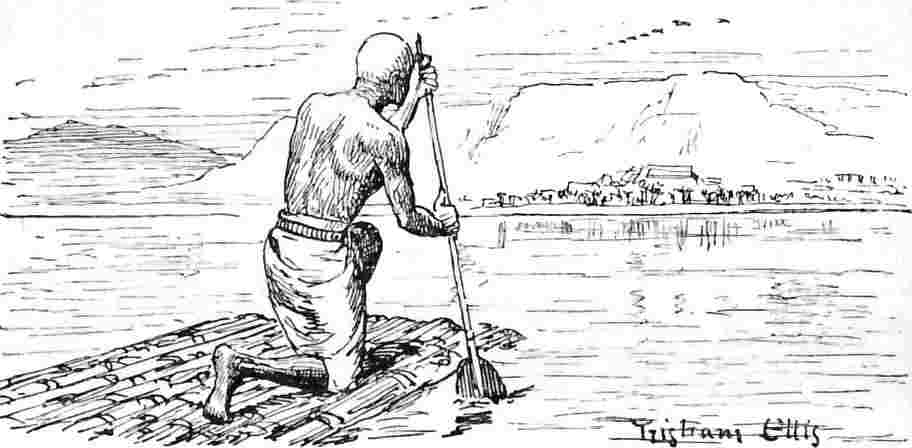
Then I turned me toward the south, not from wishing to come into this palace—for I knew not if war was declared—nor even thinking a wish to live after this sovereign,
I turned my back to the sycamore, I reached Shi-Seneferu, and rested on the open field. In the morning I went on and overtook a man, who passed by the edge of the road. He asked of me mercy, for he feared me. By the evening I drew near to Kher-ahau (? old Cairo), and I crossed the river on a raft without a rudder. Carried over by the west wind, I passed over to the east to the quarries of Aku and the land of the goddess Herit, mistress of the red mountain (Gebel Ahmar). Then I fled on foot, northward, and reached the walls of the prince, built to repel the Sati. I crouched in a bush for fear of being seen by the guards, changed each day, who watch on the top of the fortress. I took my way by night, and at the lighting or the day I reached Peten, and turned me toward the valley of Kemur. Then thirst hasted me on; I dried up, and my throat narrowed, and I said, "This is the taste of death." When I lifted up my heart and gathered strength, I heard a voice and the lowing of cattle. I saw men of the Sati, and one of them—a friend unto Egypt—knew me. Behold he gave me water and boiled me milk, and I went with him to his camp; they did me good, and one tribe passed me on to another. I passed on to Sun, and reached the land of Adim (Edom).
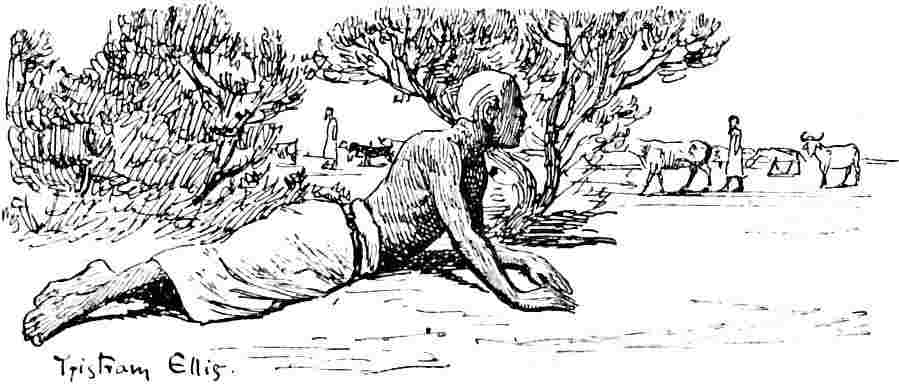
When I had dwelt there half a year Amu-an-shi—who is the prince of the Upper Tenu—sent for me and said: "Dwell thou with me that thou mayest hear the speech of Egypt." He said thus for that he knew of my excellence, and had heard tell of my worth, for men of Egypt who were there with him bore witness of me. Behold he said to me, "For what cause hast thou come hither? Has a matter come to pass in the palace? Has the king of the two lands, Sehetep-abra gone to heaven? That which has happened about this is not known." But I answered with concealment, and said, "When I came from the land of the Tamahu, and my desires were there changed in me, if I fled away it was not by reason of remorse that I took the way of a fugitive; I have not failed in my duty, my mouth has not said any bitter words, I have not heard any evil counsel, my name has not come into the mouth of a magistrate. I know not by what I have been led into this land." And Amu-an-shi said, "This is by the will of the god (king of Egypt), for what is a land like if it know not that excellent god, of whom the dread is upon the lands of strangers, as they dread Sekhet in a year of pestilence." I spake to him, and replied, "Forgive me, his son now enters the palace, and has received the heritage of his father. He is a god who has none like him, and there is none before him. He is a master of wisdom, prudent in his designs, excellent in his decrees, with good-will to him who goes or who comes; he subdued the land of strangers while his father yet lived in his palace, and he rendered account of that which his father destined him to perform. He is a brave man, who verily strikes with his sword; a valiant one, who has not his equal; he springs upon the barbarians, and throws himself on the spoilers; he breaks the horns and weakens the hands, and those whom he smites cannot raise the buckler. He is fearless, and dashes the heads, and none can stand before him. He is swift of foot, to destroy him who flies; and none who flees from him reaches his home. His heart is strong in his time; he is a lion who strikes with the claw, and never has he turned his back. His heart is closed to pity; and when he sees multitudes, he leaves none to live behind him. He is a valiant one who springs in front when he sees resistance; he is a warrior who rejoices when he flies on the barbarians. He seizes the buckler, he rushes forward, he never needs to strike again, he slays and none can turn his lance; and when he takes the bow the barbarians flee from his arms like dogs; for the great goddess has given to him to strike those who know her not; and if he reaches forth he spares none, and leaves nought behind. He is a friend of great sweetness, who knows how to gain love; his land loves him more than itself, and rejoices in him more than in its own god; men and women run to his call. A king, he has ruled from his birth; he, from his birth, has increased births, a sole being, a divine essence, by whom this land rejoices to be governed. He enlarges the borders of the South, but he covets not the lands of the North; he does not smite the Sati, nor crush the Nemau-shau If he descends here, let him know thy name, by the homage which thou wilt pay to his majesty. For he refuses not to bless the land which obeys him."
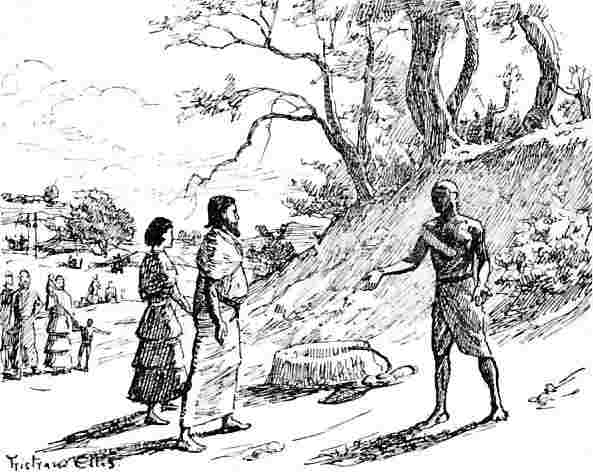
And he replied to me, "Egypt is indeed happy and well settled; behold thou art far from it, but whilst thou art with me I will do good unto thee." And he placed me before his children, he married his eldest daughter to me, and gave me the choice of all his land, even among the best of that which he had on the border of the next land. It is a goodly land, laa is its name. There are figs and grapes; there is wine commoner than water; abundant is the honey, many are its olives; and all fruits are upon its trees; there is barley and wheat, and cattle of kinds without end. This was truly a great thing that he granted me, when the prince came to invest me, and establish me as prince of a tribe in the best of his land. I had my continual portion of bread and of wine each day, of cooked meat, of roasted fowl, as well as the wild game which I took, or which was brought to me, besides what my dogs captured. They made me much butter, and prepared milk of all kinds. I passed many years, the children that I had became great, each ruling his tribe. When a messenger went or came to the palace, he turned aside from the way to come to me; for I helped every man. I gave water to the thirsty, I set on his way him who went astray, and I rescued the robbed. The Sati who went far, to strike and turn back the princes of other lands, I ordained their goings; for the Prince of the Tenu for many years appointed me to be general of his soldiers. In every land which I attacked I played the champion, I took the cattle, I led away the vassals, I carried off the slaves, I slew the people, by my sword, my bow, my marches and my good devices. I was excellent to the heart of my prince; he loved me when he knew my power, and set me over his children when he saw the strength of my arms.
A champion of the Tenu came to defy me in my tent: a bold man without equal, for he had vanquished the whole country. He said, "Let Sanehat fight with me;" for he desired to overthrow me, he thought to take my cattle for his tribe. The prince councilled with me. I said, "I know him not. I certainly am not of his degree, I hold me far from his place. Have I ever opened his door, or leaped over his fence? It is some envious jealousy from seeing me; does he think that I am like some steer among the cows, whom the bull overthrows? If this is a wretch who thinks to enrich himself at my cost, not a Bedawi and a Bedawi fit for fight, then let us put the matter to judgment. Verily a true bull loves battle, but a vain-glorious bull turns his back for fear of contest; if he has a heart for combat, let him speak what he pleases. Will God forget what He has ordained, and how shall that be known?" I lay down; and when I had rested I strung my bow, I made ready my arrows, I loosened my poignard, I furbished my arms.
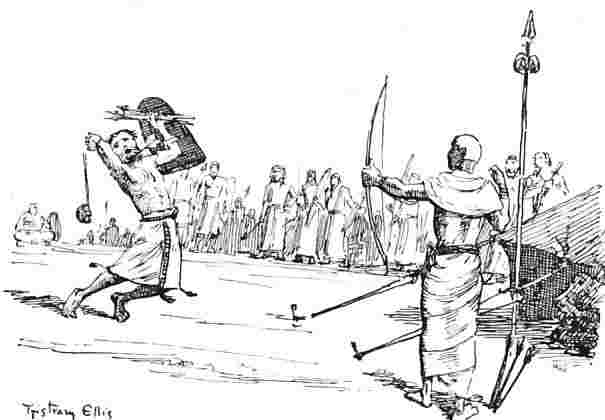 At dawn the land of the Tenu came together; it had gathered its tribes and called all the neighbouring people, it spake of nothing but the fight. Each heart burnt for me, men and women crying out; for each heart was troubled for me, and they said, "Is there another strong one who would fight with him? Behold the adversary has a buckler, a battle axe, and an armful of javelins." Then I drew him to the attack; I turned aside his arrows, and they struck the ground in vain. One drew near to the other, and he fell on me, and then I shot him. My arrow fastened in his neck, he cried out, and fell on his face: I drove his lance into him, and raised my shout of victory on his back. Whilst all the men of the land rejoiced, I, and his vassals whom he had oppressed, gave thanks unto Mentu. This prince, Amu-an-shi, embraced me. Then I carried off his goods and took his cattle, that which he had wished to do to me, I did even so unto him; I seized that which was in his tent, I spoiled his dwelling. As time went on I increased the richness of my treasures and the number of my cattle.
At dawn the land of the Tenu came together; it had gathered its tribes and called all the neighbouring people, it spake of nothing but the fight. Each heart burnt for me, men and women crying out; for each heart was troubled for me, and they said, "Is there another strong one who would fight with him? Behold the adversary has a buckler, a battle axe, and an armful of javelins." Then I drew him to the attack; I turned aside his arrows, and they struck the ground in vain. One drew near to the other, and he fell on me, and then I shot him. My arrow fastened in his neck, he cried out, and fell on his face: I drove his lance into him, and raised my shout of victory on his back. Whilst all the men of the land rejoiced, I, and his vassals whom he had oppressed, gave thanks unto Mentu. This prince, Amu-an-shi, embraced me. Then I carried off his goods and took his cattle, that which he had wished to do to me, I did even so unto him; I seized that which was in his tent, I spoiled his dwelling. As time went on I increased the richness of my treasures and the number of my cattle.
Petition to the King of Egypt
"Now behold what the god has done for me who trusted in him. Having once fled away, yet now there is a witness of me in the palace. Once having fled away, as a fugitive, —now all in the palace give unto me a good name. After that I had been dying of hunger, now I give bread to those around. I had left my land naked, and now I am clothed in fine linen. After having been a wanderer without followers, now I possess many serfs. My house is fine, my land wide, my memory is established in the temple of all the gods. And let this flight obtain thy forgiveness; that I may be appointed in the palace; that I may see the place where my heart dwells. How great a thing is it that my body should be embalmed in the land where I was born! To return there is happiness. I have made offering to God, to grant me this thing. His heart suffers who has run away unto a strange land. Let him hear the prayer of him who is afar off, that he may revisit the place of his birth, and the place from which he removed.
"May the king of Egypt be gracious to me that I may live of his favour. And I render my homage to the mistress of the land, who is in his palace; may I hear the news of her children. Thus will my limbs grow young again. Now old age comes, feebleness seizes me, my eyes are heavy, my arms are feeble, my legs will not move, my heart is slow. Death draws nigh to me, soon shall they lead me to the city of eternity. Let me follow the mistress of all (the queen, his former mistress); lo! let her tell me the excellencies of her children; may she bring eternity to me."
Then the majesty of King Kheper-ka-ra, the blessed, spake upon this my desire that I had made to him. His majesty sent unto me with presents from the king, that he might enlarge the heart of his servant, like unto the province of any strange land; and the royal sons who are in the palace addressed themselves unto me.
Copy of the decree which was brought
—to me who speak to you—
to lead me back into Egypt.
"The Horus, life of births, lord of the crowns, life of births, king of Upper and Lower Egypt, Kheper-ka-ra, son of the Sun, Amen-em-hat, ever living unto eternity. Order for the follower Sanehat. Behold this order of the king is sent to thee to instruct thee of his will.
"Now, although thou hast gone through strange lands from Adim to Tenu, and passed from one country to another at the wish of thy heart—behold, what hast thou done, or what has been done against thee, that is amiss? Moreover, thou reviledst not; but if thy word was denied, thou didst not speak again in the assembly of the nobles, even if thou wast desired. Now, therefore, that thou hast thought on this matter which has come to thy mind, let thy heart not change again; for this thy Heaven (queen), who is in the palace is fixed, she is flourishing, she is enjoying the best in the kingdom of the land, and her children are in the chambers of the palace.
"Leave all the riches that thou hast, and that are with thee, altogether. When thou shalt come into Egypt behold the palace, and when thou shalt enter the palace, bow thy face to the ground before the Great House; thou shalt be chief among the companions. And day by day behold thou growest old; thy vigour is lost, and thou thinkest on the day of burial. Thou shalt see thyself come to the blessed state, they shall give thee the bandages from the hand of Tait, the night of applying the oil of embalming. They shall follow thy funeral, and visit the tomb on the day of burial, which shall be in a gilded case, the head painted with blue, a canopy of cypress wood above thee, and oxen shall draw thee, the singers going before thee, and they shall dance the funeral dance. The weepers crouching at the door of thy tomb shall cry aloud the prayers for offerings: they shall slay victims for thee at the door of thy pit; and thy pyramid shall be carved in white stone, in the company of the royal children. Thus thou shalt not die in a strange land, nor be buried by the Amu; thou shalt not be laid in a sheep-skin when thou art buried; all people shall beat the earth, and lament on thy body when thou goest to the tomb."
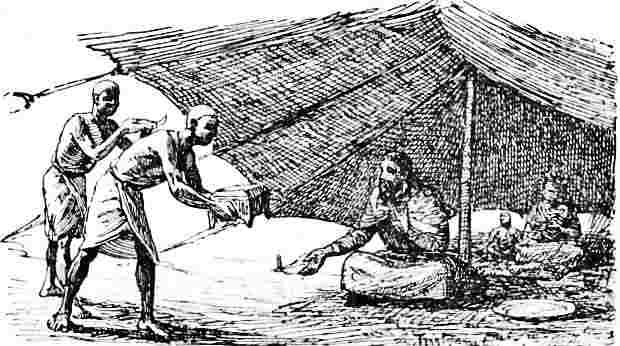
When this order came to me, I was in the midst of my tribe. When it was read unto me, I threw me on the dust, I threw dust in my hair; I went around my tent rejoicing and saying, "How may it be that such a thing is done to the servant, who with a rebellious heart has fled to strange lands? Now with an excellent deliverance, and mercy delivering me from death, thou shall cause me to end my days in the palace."
Copy of the Answer to This Order
"The follower Sanehat says: In excellent peace above everything consider of this flight that he made here in his ignorance; Thou, the Good God, Lord of both Lands, Loved of Ra, Favourite of Mentu, the lord of Thebes, and of Amen, lord of thrones of the lands, of Sebek, Ra, Horus, Hathor, Atmu, and of his fellow-gods, of Sopdu, Neferbiu, Samsetu, Horus, lord of the east, and of the royal uraeus which rules on thy head, of the chief gods of the waters, of Min, Horus of the desert, Urrit, mistress of Punt, Nut, Harnekht, Ra, all the gods of the land of Egypt, and of the isles of the sea. May they give life and peace to thy nostril, may they load thee with their gifts, may they give to thee eternity without end, everlastingness without bound. May the fear of thee be doubled in the lands of the deserts. Mayest thou subdue the circuit of the sun's disc. This is the prayer to his master of the humble servant who is saved from a foreign land.
"O wise king, the wise words which are pronounced in the wisdom of the majesty of the sovereign, thy humble servant fears to tell. It is a great thing to repeat. O great God, like unto Ra in fulfilling that to which he has set his hand, what am I that he should take thought for me? Am I among those whom he regards, and for whom he arranges? Thy majesty is as Horus, and the strength of thy arms extends to all lands.
"Then let his Majesty bring Maki of Adma, Kenti-au-ush of Khenti-keshu, and Tenus from the two lands ol the Fenkhu; these are the princes who bear witness of me as to all that has passed, out of love for thyself. Does not Tenu believe that it belongs to thee like thy dogs. Behold this flight that I have made: I did not have it in my heart; it was like the leading of a dream, as a man of Adehi (Delta) sees himself in Abu (Elephantine), as a man of the plain of Egypt who sees himself in the deserts. There was no fear, there was no hastening after me, I did not listen to an evil plot, my name was not heard in the mouth of the magistrate; but my limbs went, my feet wandered, my heart drew me; my god commanded this flight, and drew me on; but I am not stiff-necked. Does a man fear when he sees his own land? Ra spread thy fear over the land, thy terrors in every strange land. Behold me now in the palace, behold me in this place; and lo! thou art he who is over all the horizon; the sun rises at thy pleasure, the water in the rivers is drunk at thy will, the wind in heaven is breathed at thy saying.
"I who speak to thee shall leave my goods to the generations to follow in this land. And as to this messenger who is come even let thy majesty do as pleaseth him, for one lives by the breath that thou givest. O thou who art beloved of Ra, of Horus, and of Hathor; Mentu, lord of Thebes, desires that thy august nostril should live for ever."
I made a feast in Iaa, to pass over my goods to my children. My eldest son was leading my tribe, all my goods passed to him, and I gave him my corn and all my cattle, my fruit, and all my pleasant trees. When I had taken my road to the south, and arrived at the roads of Horus, the officer who was over the garrison sent a messenger to the palace to give notice. His majesty sent the good overseer of the peasants of the king's domains, and boats laden with presents from the king for the Sati who had come to conduct me to the roads of Horus. I spoke to each one by his name, and I gave the presents to each as was intended. I received and I returned the salutation, and I continued thus until I reached the city of Thetu.
When the land was brightened, and the new day began, four men came with a summons for me; and the four men went to lead me to the palace. I saluted with both my hands on the ground; the royal children stood at the courtyard to conduct me: the courtiers who were to lead me to the hall brought me on the way to the royal chamber.
I found his Majesty on the great throne in the hall of pale gold. Then I threw myself on my belly; this god, in whose presence I was, knew me not. He questioned me graciously, but I was as one seized with blindness, my spirit fainted, my limbs failed, my heart was no longer in my bosom, and I knew the difference between life and death. His majesty said to one of the companions, "Lift him up, let him speak to me." And his majesty said, "Behold thou hast come, thou hast trodden the deserts, thou hast played the wanderer. Decay falls on thee, old age has reached thee; it is no small thing that thy body should be embalmed, that the Pedtiu shall not bury thee. Do not, do not, be silent and speechless; tell thy name; is it fear that prevents thee?" I answered in reply, "I fear, what is it that my lord has said that I should answer it? I have not called on me the hand of God, but it is terror in my body, like that which brings sudden death. Now behold I am before thee; thou art life; let thy majesty do what pleaseth him."
The royal children were brought in, and his majesty said to the queen,
"Behold thou Sanehat has come as an Amu, whom the Sati have produced."
She cried aloud, and the royal children spake with one voice, saying, before his majesty, "Verily it is not so, O king, my lord." Said his majesty, "It is verily he." Then they brought their collars, and their wands, and their sistra in their hands, and displayed them before his majesty; and they sang—
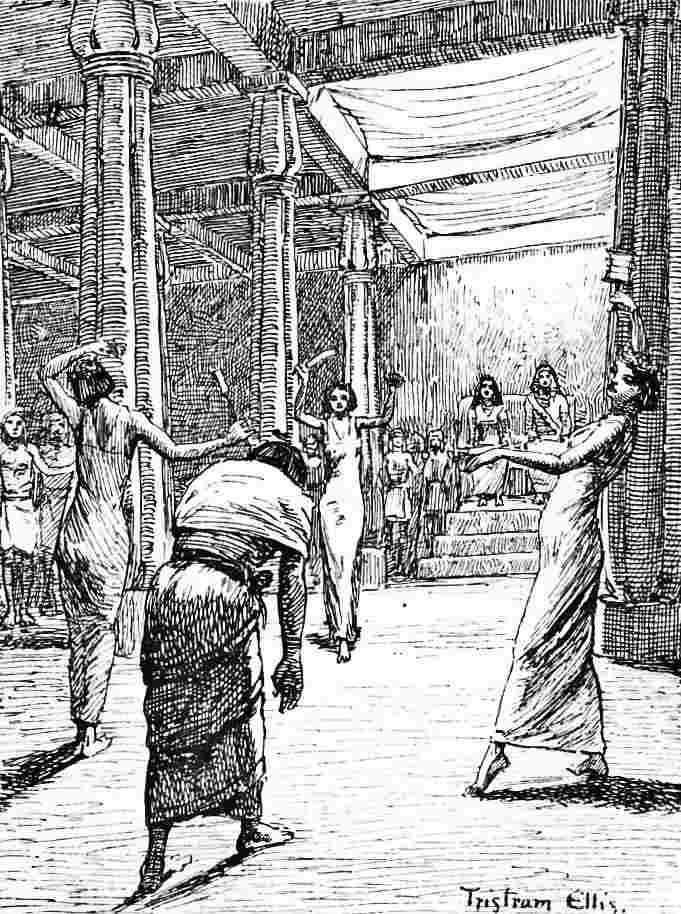
"May thy hands prosper, O king;
May the ornaments of the Lady of Heaven continue.
May the goddess Nub give life to thy nostril;
May the mistress of the stars favour thee, when thou sailest south and north.
All wisdom is in the mouth of thy majesty;
Thy uraeus is on thy forehead, thou drivest away the miserable.
"Thou art pacified, O Ra, lord of the lands;
They call on thee as on the mistress of all.
Strong is thy horn, Thou lettest fly thine arrow.
Grant the breath to him who is without it;
Grant good things to this traveller, Samehit the Pedti, born in the land of Egypt,
Who fled away from fear of thee,
And fled this land from thy terrors.
Does not the face grow pale, of him who beholds thy countenance;
Does not the eye fear, which looks upon thee."
Said his majesty, "Let him not fear, let him be freed from terror. He shall be a Royal Friend amongst the nobles; he shall be put within the circle of the courtiers. Go ye to the chamber of praise to seek wealth for him."
When I went out from the palace, the royal children offered their hands to me; we walked afterwards to the Great Gates. I was placed in a house of a king's son, in which were delicate things, a place of coolness, fruits of the granary, treasures of the White House, clothes of the king's guardrobe, frankincense, the finest perfumes of the king and the nobles whom he loves, in every chamber. All the servitors were in their several offices.
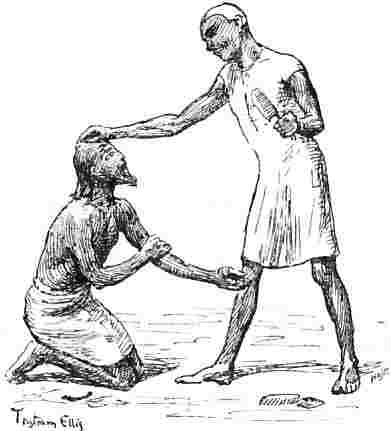
Years were removed from my limbs: I was shaved, and polled my locks of hair; the foulness was cast to the desert with the garments of the Nemau-sha. I clothed me in fine linen, and anointed myself with the fine oil of Egypt; I laid me on a bed. I gave up the sand to those who lie on it; the oil of wood to him who would anoint himself therewith. There was given to me the mansion of a lord of serfs, which had belonged to a royal friend. There many excellent things were in its buildings; all its wood was renewed. There were brought to me portions from the palace, thrice and four times each day; besides the gifts of the royal children, always, without ceasing. There was built for me a pyramid of stone amongst the pyramids. The overseer of the architects measured its ground; the chief treasurer wrote it; the sacred masons cut the well; the chief of the labourers on the tombs brought the bricks; all things used to make strong a building were there used. There were given to me peasants; there were made for me a garden, and fields in it before my mansion, as is done for the chief royal friend. My statue was inlayed with gold, its girdle of pale gold; his majesty caused it to be made. Such is not done to a man of low degree.
May I be in the favour of the king until the day shall come of my death.
(This is finished from beginning to end, as was found in the writing.)
Return to top.
Remarks
The Adventures of Sanehat appears to have been a popular tale, as portions of three copies remain. The first papyrus known (Berlin No. 1) was imperfect at the beginning; but since then a flake of limestone found in a tomb bore the beginning of the tale, and the same part is found on a papyrus in the Amherst collection. The main text has been translated by Chabas ("Le papyrus de Berlin," 37-51), Goodwin, and Maspero ("Mel. d'arch.," iii. 68, 140, and "Contes Populaire," 89-130); while the beginning is treated in "Memoires de l'institut Egyptien," ii. 1-23, and in Proc. S.B.A., 452. The present translation is mainly based on Mr. Griffith's readings in all cases of difficulty.
This is perhaps the most interesting of all the tales, because it bears such signs of being written in the times of which it treats, it throws so much light on the life of the time in Egypt and Syria, and if not a real narrative, it is at least so probable that it may be accepted without much difficulty. For my own part, I incline to look on it as strictly historical; and in the absence of a single point of doubt, I shall here treat it as seriously as the biographical inscriptions of the early tombs. Possibly some day the tomb of Sanehat may be found, and the whole inscription be read complete upon the walls.
The name Sa-nehat means "son of the sycamore," probably from his having been born, or living, at some place where was a celebrated sacred sycamore. This was a common tree in ancient, as in modern, Egypt; but an allusion in the tale, to Sanehat turning his back on the sycamore, when he was fleeing apparently up the west side of the Delta, makes it probable that the sycamore was that of Aa-tenen, now Batnun, at the middle of the west side of the Delta.
The titles given to Sanehat at the opening are of a very high rank, and imply that he was the son either of the king or of a great noble. And his position in the queen's household shows him to have been of importance; the manner in which he is received by the royal family at the end implying that he was quite familiar with them in early days.
But the great difficulty in the account has been the sudden panic of Sanehat on hearing of the death of Amenemhat, and no explanation of this has yet been brought forward. It seems not unlikely that he was a son of Amenemhat by some concubine. This would at once account for his high titles—for his belonging to the royal household—for his fear of his elder brother Usertesen, who might see in him a rival, and try to slay him after his father's death—for the command to him to leave all his possessions and family behind him in Syria, as the condition of his being allowed to return to end his days in Egypt—for his familiar reception by the royal family, and for the property given to him on his return.
The date recorded for the death of Sehote-pabra—Amenemhat I., the founder of the XIIth Dynasty—agrees with the limit of his reign on the monuments. And the expressions for his death are valuable as showing the manner in which a king's decease was regarded; under the emblem of a hawk—the bird of Ra—he flew up and joined the sun.
Sometime before his death Amenemhat had been in retirement; after twenty years of reign (which was probably rather late in his life, as he seems to have forced his way to the front as a successful man and founder of a family) he had associated his son, the first Usertesen, on the throne, and apparently resigned active life; for in the third year of Usertesen we find the coregent summoning his court and decreeing the founding of the temple of Heliopolis without any mention of his father. The old king, however, lived yet ten years after his retirement, and died (as this narrative shows us) during an expedition of his son Usertesen.
The time of year mentioned here would fall in about the middle of the inundation in those days. Hence it seems that the military expeditions were made after the harvest was secured, and while the country was under water and the population disengaged from other labour.
The course of Sanehat's flight southward, reaching the Nile at Cairo after two days' haste, indicates that the army was somewhere west of the Delta. This would point to its being on the road to the oasis of the Natron Lakes, which would be the natural course for a body of men needing water supply. His throwing himself between two bushes to hide from the army shows that the message came early in the day, otherwise he would have fled in the dark. He then fled a day's journey to the south, turning his back on the sycamore, and slept in the open field at Shi-Seneferu somewhere below the Barrage. The second day he reached the Nile opposite Old Cairo in the afternoon, and ferried himself over, passed the quarries at Gebel Mokattam, and the red hill of Gebel Ahmar, and came to a frontier wall before dark. This cannot have been far from Old Cairo, by the time; and as Heliopolis was in course of building by Usertesen, it would be probably on the desert near there, for the protection of the town. Passing the desert guards by night he pushed on and reached Peten, near Belbeis, by dawn, and turned east toward the valley of Kemur, or Wady Tumilat. Here in his extremity he was found by the Sati or Asiatics, and rescued. This shows that the eastern desert was left to the wandering tribes, and was without any regular government at this period; though all the eastern Delta was already well in Egyptian hands, as we know by the monuments at Bubastis, Dedamun, and Tanis.
The land of Adim to which Sanehat fled appears to be the same as Edom or the southeast corner of Syria. It was evidently near the upper Tenu, or Rutennu, who seem to have dwelt on the hill country of Palestine. The hill and the plain of Palestine are so markedly different, that in all ages they have tended to be held by opposing people. In the time of Sanehat the upper Tenu who held the hills were opposed to the Tenu in general who held the plains; later on the Semites of the hills opposed the Philistines of the plain, and now the fellah of the hills opposes the Bedawi of the plain. The district of Amuanshi in which Sanehat settled was a goodly land, bearing figs and grapes and olives, flowing with wine and honey and oil, yielding barley and wheat without end, and much cattle. This abundance points rather to the hill country near Hebron or between there and Belt Jibrin, as this south part of the hills is notably fertile. The Tenu who came to defy Sanehat, being in opposition to the upper Tenu, were probably those of the plain; and the opposition to Sanehat may have arisen from his encroaching on the fertile plain at the foot of his hills, as he was in the best of the land "on the border of the next land."
The Egyptian was evidently looked on as being of a superior race by the Tenu, and his civilisation won for him the confidence which many wandering Englishmen now find in Africa or Polynesia, like John Dunn. The set combat of two champions seems—by the large gathering—to have been a well-recognised custom among the Tenu, while it exactly accords with Goliath's offer in later times. And raising the shout of victory on the back of the fallen champion reminds us of David's standing on Goliath.
The transition from the recital of the Syrian adventures to the petition to Pharaoh is not marked in the manuscript; but from the construction the beginning of the petition is evidently at the place here marked. The manner in which Sanehat appeals to the queen shows how well he must have been known to her in his former days.
The decree in reply to Sanehat is in the regular style of royal decrees of the period. Apparently by a clerical error the scribe has substituted the name Amenemhat for Userte-sen, but the Horus name and the throne name leave no doubt that Usertesen I. is intended here. The tone of the reply is as gracious as possible, according with the king's character as stated by Sanehat, "He is a friend of great sweetness, and knows how to gain love." He quite recognises the inquiries after the queen, and replies concerning her. And then he assures Sanehat of welcome on his return, and promises him all that he asks, including a tomb "in the company of the royal children," a full recognition of his real rank. Incidentally we learn that the Amu buried their dead wrapped in a sheep's skin; as we also learn, further on, that they anointed themselves with oil (olive?), wore the hair long, and slept on the ground.
The funeral that is promised accords with the burials of the XIIth Dynasty: the gilded case, the head painted blue, and the canopy of cypress wood, are all known of this period, but would be out of place in describing a Ramesside burial.
Sanehat's reply is a full course of the usual religious adulation, and differs in this remarkably from his petition. In fact it is hard to be certain where his petition begins; possibly the opening of it has been lost out of the text in copying from a mutilated papyrus; or possibly it was sent merely as a memorandum of Sanehat's position and desires, without venturing to address it personally to the king; or even it may have not been allowable then to make such petitions formally, so as to leave the initiative to the king's free will, just as it is not allowable nowadays to question royalty, but only to answer when spoken to.
The proposal to bring forward his fellow-sheikhs as witnesses of his unabated loyalty is very curious, and seems superfluous after Usertesen's assurances. Beyond Abisha of the Amu at Beni Hasan, these are the only early personal names of Syrians that we know. The Fenkhu in this connection can hardly be other than the Phoenicians; and, if so, this points to their being already established in southern Syria at this date. But these chiefs were not allowed to come forward; and it seems to have been the policy of Egypt to keep the Syrians off as much as possible, not a single man who came with Sanehat being allowed to cross the frontier. The allusion to the Tenu belonging to Pharaoh, like his dogs, is peculiarly fitting to this period, as the dog seems to have been more familiarly domesticated in the XIth and XIIth Dynasties than at any other age, and dogs are often then represented on the funereal steles, even with their names.
The expression for strangeness—"as a man of the Delta sees himself at the cataract, as a man of the plain who sees himself in the deserts"—is true to this day. Nothing upsets an Egyptian's self-reliance like going back a few miles into the desert; and almost any man of the cultivated plain will flee with terror if he finds himself left alone far in the desert, or even taken to the top of the desert hills. .
We learn incidentally that the Egyptian frontier, even in the later years of Usertesen I., had not been pushed beyond the Wady Tumilat; for Sanehat travels south to the Roads of Horus, where he finds the frontier garrison, and leaves his Syrian friends; and there laden boats meet him, showing that it must have been somewhere along a waterway from the Nile.
The abasement of Sanehat might well be due to natural causes, beside the reverence for the divine person of the king. The Egyptian court must have seemed oppressively splendid, with the brilliant and costly workmanship of Usertesen, to one who had lived a half-wild life for so many years; and, more than that, the recalling of all his early days and habits and friendships would overwhelm his mind and make it difficult to collect his thoughts.
Sanehat's appearance was so much changed by his long hair, his age, and his strange dress, that his former mistress and companions could not recognise him. The use of collars and sceptres in the song and dance is not clear to us. The sistra were, of course, to beat or rattle in time with the song; the sceptres or wands were perhaps the same as the engraved wands of ivory common in the XIIth Dynasty, or of blue glazed ware in XVIIIth, and would be used to wave or beat time with; but the use of the collar and counterpoise, or menat, is unexplained, though figures of dancers are shown holding a collar and menat, and such objects were found buried in the ceremonial foundation deposit of Tahutmes III. at Koptos.
This song of the princesses is clearly in parallel phrases. First are four wishes for the king and queen, in four lines. Second, an ascription of wisdom and power, in two lines. Third, a comparison of the king to Ra, and of the queen to the great goddess, in two lines. Fourth, an ascription of righting power. Fifth, a petition for Sanehat, winding up with the statement of fear inspired by the king, as explaining Sanehat's abasement. To this the king responds by reassuring Sanehat, and promising him position and wealth.
The account of Sanehat's renewal of his old national ways can best be appreciated by any one who has lived a rough life for a time and then comes back to civilisation. Doubtless these comforts were all the more grateful to him in his old age, when he was weary of his unsettled life.
In the preparation of his tomb it is stated to have been a pyramid, with rock-cut well chamber, and built of bricks above. This just accords with the construction of the pyramids of the XIIth Dynasty.
The last phrase implies that this was composed during Sanehat's life; and such a life would be so remarkable that this biography might be prepared with good reason. Also it is very unlikely that a mere story-teller would have dropped the relation without describing his grand funeral which was promised to him. From suddenly stopping at the preparation of the tomb, without going further, we have a strong presumption that this was a true narrative, written at Sanehat's dictation, and probably intended to be inscribed on his tomb wall. In any case, we have here an invaluable picture of life in Palestine and in Egypt, and the relations of the two countries, at an epoch before the time of Abraham, and not paralleled by any other document until more than a thousand years later.
Return to top.
 At dawn the land of the Tenu came together; it had gathered its tribes and called all the neighbouring people, it spake of nothing but the fight. Each heart burnt for me, men and women crying out; for each heart was troubled for me, and they said, "Is there another strong one who would fight with him? Behold the adversary has a buckler, a battle axe, and an armful of javelins." Then I drew him to the attack; I turned aside his arrows, and they struck the ground in vain. One drew near to the other, and he fell on me, and then I shot him. My arrow fastened in his neck, he cried out, and fell on his face: I drove his lance into him, and raised my shout of victory on his back. Whilst all the men of the land rejoiced, I, and his vassals whom he had oppressed, gave thanks unto Mentu. This prince, Amu-an-shi, embraced me. Then I carried off his goods and took his cattle, that which he had wished to do to me, I did even so unto him; I seized that which was in his tent, I spoiled his dwelling. As time went on I increased the richness of my treasures and the number of my cattle.
At dawn the land of the Tenu came together; it had gathered its tribes and called all the neighbouring people, it spake of nothing but the fight. Each heart burnt for me, men and women crying out; for each heart was troubled for me, and they said, "Is there another strong one who would fight with him? Behold the adversary has a buckler, a battle axe, and an armful of javelins." Then I drew him to the attack; I turned aside his arrows, and they struck the ground in vain. One drew near to the other, and he fell on me, and then I shot him. My arrow fastened in his neck, he cried out, and fell on his face: I drove his lance into him, and raised my shout of victory on his back. Whilst all the men of the land rejoiced, I, and his vassals whom he had oppressed, gave thanks unto Mentu. This prince, Amu-an-shi, embraced me. Then I carried off his goods and took his cattle, that which he had wished to do to me, I did even so unto him; I seized that which was in his tent, I spoiled his dwelling. As time went on I increased the richness of my treasures and the number of my cattle.





